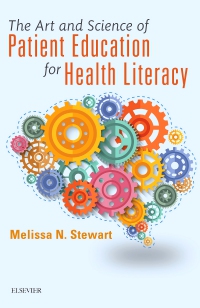
The Art and Science of Patient Education for Health Literacy, 1st Edition
Paperback

Most healthcare providers know that health literacy is a major barrier to positive health outcomes, but regardless of good intentions they continue to simply present health information rather than promote deep patient learning. With Dr. Melissa N. Stewart’s unique, research-driven approach, The Art and Science of Patient Education for Health Literacy helps you make the shift from simply presenting health information to activating deep patient learning. Revised and thoroughly updated from Dr. Stewart’s Practical Patient Literacy: The MEDAGOGY Model, The Art and Science of Patient Education for Health Literacy equips both students and healthcare providers with the skills needed to engage patients' brains in order to help them understand their conditions and promote long-lasting behavior change. Based on the neuroscience of learning, this groundbreaking book is packed with abundant tools to teach students and practitioners alike how to negotiate effectively with patients about what they will and won't do to maintain and improve their health. Equipped with enhanced levels of health literacy, your patients will better understand their illnesses and become their own best healthcare advocates.
-
- UNIQUE! Research-driven approach based on the latest findings in the neuroscience of learning.
- UNIQUE! Focus on the author’s proven patient literacy model applies a reliable methodology to promote patient health and reduce hospital readmissions.
- NEW! Addresses the emergence of health literacy as a crucial issue for the future of high-quality healthcare.
- Practical, patient-centered approach emphasizes how to help patients formulate their own healthcare goals to promote their own health.
- In-depth discussion of pedagogy and andragogy introduces how these concepts can be used to teach different patients and accommodate their educational needs.
- NEW and UNIQUE! Incorporates the author's new Self-Activation Tool to help patients activate their own learning.
- Case Studies, colorful design, and numerous illustrations promote reader engagement and active learning.
- NEW! Chapter-ending Key Points provide a focused self-check for each chapter.
- Guidance on how to understand the patient’s emotional state and grieving process helps students understand when and how to best communicate health information.
- Handy tools such as the Patient Education Hierarchy, Informational Seasons, the PITS model, and the UPP tool add direction to individual and/or team patient education efforts.
- NEW! Broader focus on different health professions provides information for a wide range of caregivers.
- NEW! Colorful design and illustrations promote reader engagement.
-
- UNIQUE! Research-driven approach based on the latest findings in the neuroscience of learning.
- NEW! Addresses the emergence of health literacy as a crucial issue for the future of high-quality healthcare.
- NEW! and UNIQUE! Incorporates the author's Self-Activation Tool to help patients activate their own learning.
- NEW! Colorful design and numerous illustrations promote reader engagement and active learning.
- NEW! Chapter-ending Key Points provide a focused self-check for each chapter.
- NEW! Broader focus on different health professions provides information for a wide range of caregivers.
-
Section I: Shifting the Focus to the Patient
1. The Problem of Health Literacy
2. The Patient’s Perspective
3. Education TheorySection II: Effective Teaching and Learning
4. Information Exchange
5. The Science and Theories of Learning
6. Health Promotion TheoriesSection III: Patient Knowledge
7. Patient Learning
8. Informational Seasons of Knowledge
9. The Brain and MemorySection IV: Information Delivery Methodology
10. The PITS Model
11. The Medagogy Conceptual Framework
12. Assessing Patient Knowledge Using the Understanding Personal Perception Tool
13. Partnership: The NEW Model of Healthcare
14. Legal Implications Associated with Patient EducationAppendices
References
Index

 as described in our
as described in our 